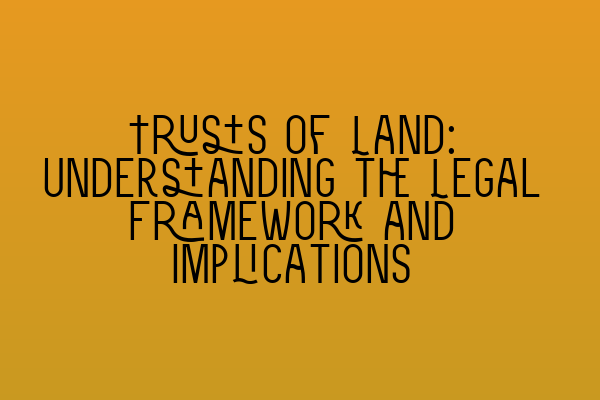Trusts of Land: Understanding the Legal Framework and Implications
At SQE Property Law & Land Law, we deal with a wide range of legal matters pertaining to property ownership. One important aspect of property law is the concept of trusts of land. In this article, we will explore the legal framework and implications of trusts of land, shedding light on this complex area of law.
What is a Trust of Land?
A trust of land is a legal arrangement where property is held and administered by one party (known as the trustee) on behalf of another party (known as the beneficiary). The trustee has the legal title to the property, while the beneficiary has the equitable interest in the property. This arrangement ensures that the property is managed and used in accordance with the wishes of the beneficiary.
Legal Framework of Trusts of Land
Trusts of land are governed by the Trusts of Land and Appointment of Trustees Act 1996 (TOLATA). TOLATA provides the legal framework for the creation, management, and termination of trusts of land. It sets out the rights and responsibilities of trustees and beneficiaries, as well as the procedures for resolving disputes related to trust property.
Implications of Trusts of Land
There are several important implications associated with trusts of land:
1. Beneficial Interests: In a trust of land, the beneficiary has a beneficial interest in the property. This means they have the right to use and enjoy the property, as well as any income it generates.
2. Duties and Powers of Trustees: Trustees have a fiduciary duty to act in the best interests of the beneficiary and manage the property responsibly. They have the power to make decisions regarding the property, such as selling, leasing, or improving it, but they must always act in accordance with their duties.
3. Disputes and Resolutions: Trusts of land can give rise to disputes between trustees and beneficiaries, or between multiple beneficiaries. TOLATA provides mechanisms for resolving these disputes, including applications to the court for directions or the appointment of new trustees.
4. Legal Formalities: Creating a trust of land requires certain legal formalities to be met, such as the agreement of all legal owners and the creation of a written trust deed. Failure to meet these formalities may render the trust ineffective.
Conclusion
Trusts of land play a crucial role in property law, ensuring that property is managed and used in accordance with the wishes of the beneficiary. Understanding the legal framework and implications of trusts of land is essential for both trustees and beneficiaries.
If you need assistance with trusts of land or any other property law matter, our team of experienced solicitors at SQE Property Law & Land Law is here to help. Contact us today for expert legal advice and guidance.
Related Articles:
– SQE 1 Practice Exam Questions
– SQE 1 Practice Mocks FLK1 FLK2
– SQE 2 Preparation Courses
– SQE 1 Preparation Courses
– SRA SQE Exam Dates
